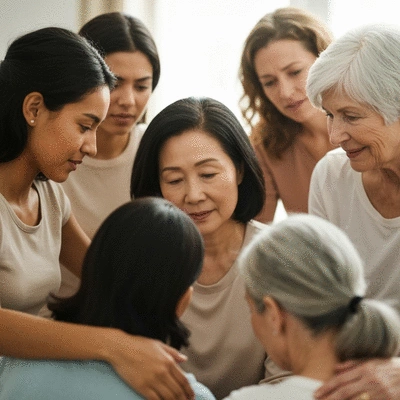Emotional Support
Knowing others have faced similar challenges fosters a sense of community and reduces isolation.

Reflecting on the journeys of breast cancer survivors offers vital insights into the healing process. Personal stories not only illuminate the challenges faced but also highlight the strength and resilience that emerge during recovery. What can we learn from these experiences?
Understanding the value of personal narratives in the mastectomy recovery journey.
Knowing others have faced similar challenges fosters a sense of community and reduces isolation.
Survivors share insights on pain management, drain care, and post-operative recovery strategies.
Personal stories can inspire a positive shift in mindset towards recovery and healing.
Hearing how others found strength motivates patients to tap into their own inner resilience.
At the Mastectomy Insight Hub, we believe that understanding the recovery journey begins with hearing from those who have walked the path themselves. Personal stories from breast cancer survivors not only shed light on the challenges faced during recovery but also highlight the resilience and strength found in these experiences. These narratives can serve as a beacon of hope, guiding others through their own journeys.
Many survivors often share how their experiences shaped their healing process. For instance, one patient recounted the importance of having a supportive network that helped her navigate the emotional and physical aspects of her recovery. These real-life examples can resonate deeply with those at the beginning of their journeys, helping to normalize feelings of fear and uncertainty. Research indicates that social support plays a crucial role in the psychological well-being of breast cancer patients, as highlighted in a study on Psychological Well-Being and Social Support in Breast Cancer Survivors.

These stories remind us that while each journey is unique, the shared experiences can foster a sense of community. As someone who has dedicated my career to supporting patients through their healing, I can attest to the power of narrative in recovery.
Sharing personal narratives is crucial for many reasons. It not only helps patients feel less isolated but also empowers them to take charge of their recovery journey. When individuals hear stories from others who have faced similar challenges, it can validate their feelings and encourage them to seek support. After all, every story has the potential to inspire someone else. The profound impact of personal narratives is further supported by studies demonstrating the positive influence of patient experiences on coping mechanisms, as discussed in this research on coping strategies among breast cancer survivors.
Moreover, these narratives can shed light on various recovery methods and coping strategies that may not be well-known. By learning from others, patients can better prepare themselves for the road ahead, understanding that they are not alone in their struggles. For insights into the psychological implications of mastectomy and coping strategies, readers can explore this review on the psychological impact of mastectomy.
What aspect of recovery do you find most challenging? Share your thoughts below:
Through my years as a surgeon, I have seen how sharing experiences can profoundly impact those navigating the complex journey of mastectomy recovery. Personal stories from breast cancer survivors serve as a beacon of hope and guidance for new patients. These narratives illustrate that while each journey is unique, there are common threads of resilience and strength that unite us all.
When survivors share their journeys, they often touch on pivotal moments: the fear before surgery, the challenges during recovery, and the triumphs over adversity. Reflecting on these experiences not only helps new patients feel less isolated but also equips them with valuable insights that can ease their own paths. Have you ever found comfort in hearing how others overcame similar struggles?

By engaging with these narratives, new patients not only learn about the realities of recovery but also recognize the power of vulnerability. Each story contributes to a larger understanding of what it means to heal, both physically and emotionally.
The recovery journey after a mastectomy is not linear; it’s filled with ups and downs that demand patience and grace. As I reflect on the experiences shared by my patients, one theme emerges consistently: embracing the journey is vital. Celebrating small victories, whether it's taking the first steps after surgery or reaching out for help, is crucial. How do you plan to honor your own journey?
Ultimately, each survivor’s path is a testament to the strength of the human spirit. When we share our stories and support one another, we create a network of hope that can uplift others in their most challenging times. As you navigate your recovery, remember that you are not alone; there’s a community here ready to embrace you.
Finding the right resources and support can make a world of difference in your recovery journey. Here are some avenues to explore:
Utilizing these resources can help ease the transition into life after mastectomy, making it feel less daunting and more manageable. Remember, seeking support is a sign of strength!
If you're a survivor, I encourage you to share your story. Your journey can empower others in ways you may never realize. Whether it’s through writing, speaking, or simply connecting with someone in need, your voice can provide hope and guidance. Have you considered how sharing your insights might impact someone else’s recovery?
Peer mentorship is a powerful way to foster connections and support among individuals facing similar challenges. By becoming a mentor, you can provide guidance, share resources, and offer emotional backing. Together, we can build a supportive community that not only helps individuals navigate their recovery but also celebrates their resilience. Let’s connect and uplift one another as we journey through healing together!
Here is a quick recap of the important points discussed in the article:
Caring for Drains and Incisions

When it comes to recovery after a mastectomy, understanding the role of surgical drains can be both
Mastectomy Preparation: Key Instructions Explained

As you prepare for your mastectomy, understanding what lies ahead can transform uncertainty into con
Embracing Flat: Real Patient Stories

What if the journey after a mastectomy could be navigated with confidence and empowerment? Understan
Caring for Drains and Incisions
Mastectomy Preparation: Key Instructions Explained
Embracing Flat: Real Patient Stories
Patient Support in Mastectomy Recovery
Mastectomy Complications and Care Guide